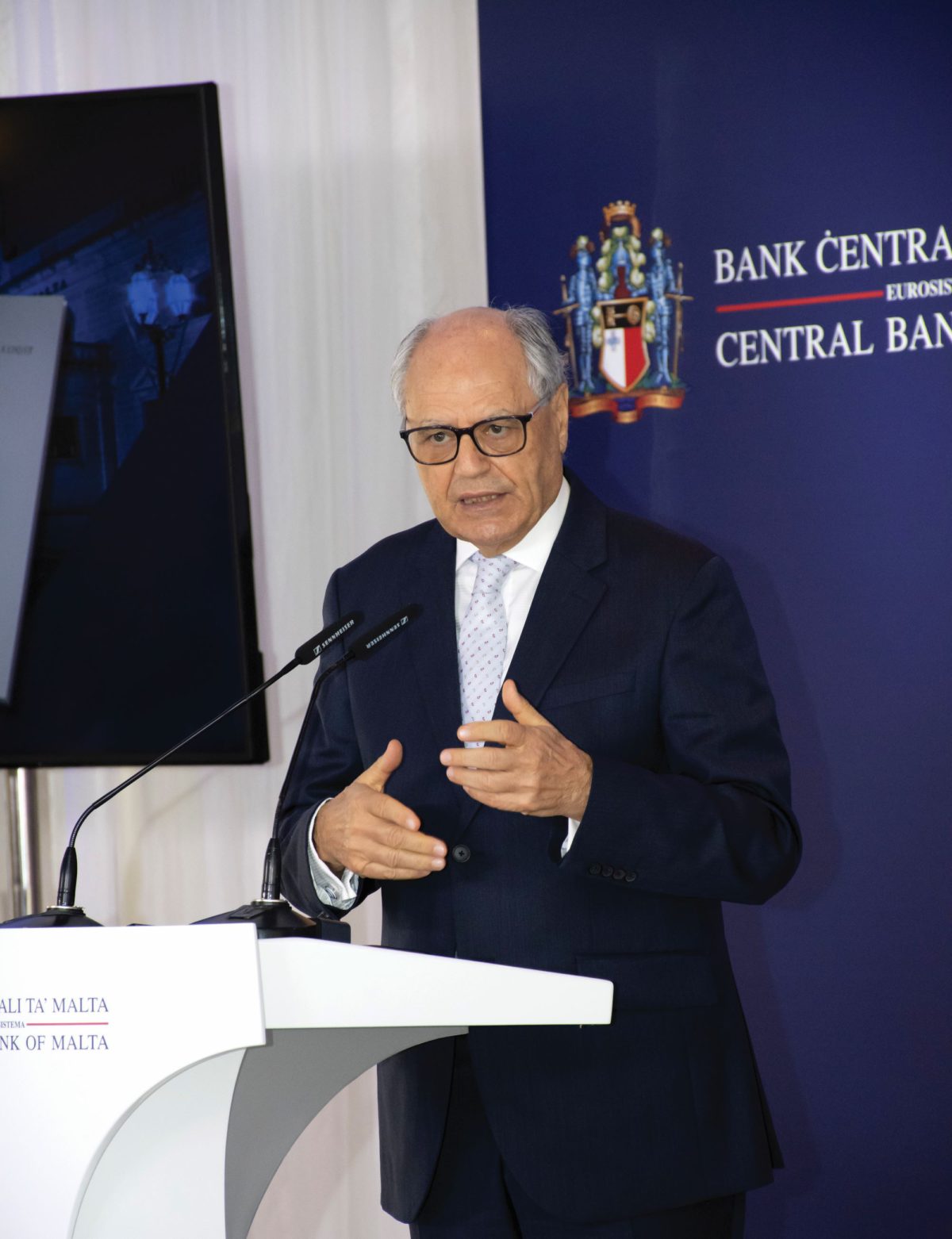“Malta was among the countries hit hardest by the pandemic, due to its greater reliance on high contact-services like tourism. However, the recovery from that shock was also faster,” affirms Central Bank Governor Prof Edward Scicluna, reflecting on the state of the island’s economy in today’s unique, post-pandemic scenario.
In part, the former Finance Minister believes that this reflects the swift rebound in services when economies re-opened, which was more beneficial for service-oriented economies like ours. Another important factor though, the Governor attests, was the extensive fiscal support that the Maltese Government deployed to preserve the economy’s productive structures and employment. The diversification of the economy and sound macroeconomic management in the years prior also helped.
According to Prof Scicluna, many of these factors also explain why the Maltese economy continues to outperform the euro area even since the onset of the Russia-Ukraine war. “While COVID-related support had largely faded, Government offered generous energy subsidies that sheltered households and businesses from soaring energy costs. Coupled with the significant liquidity that the private sector had accumulated, this provided extra support to demand,” he maintains, adding that one must also acknowledge Malta’s very limited direct links with Russia and Ukraine, and the fact that, unlike the pandemic, the war mostly affected energy-intensive industries that are less pervasive in Malta.
Reflecting on the principal trends relating to the Maltese economy in comparison to the Eurozone and the EU average, the Governor says that we are currently seeing a continuation of a well-established pattern in the data: both GDP and employment growth continue to exceed those in the euro area. Correspondingly, Malta has a much lower unemployment rate compared to the euro area, even though in both economies this rate is low from a historical perspective. In fact, he continues, labour market tightness – as measured by the ratio of the vacancy rate to the unemployment rate – is among the highest in the euro area. This is confirmed by the incidence of labour shortages as a limiting factor for production in European Commission business surveys.

As in other euro area countries, Malta is also faced with high inflation and an urgent need to strengthen public finances. Here too, however, Prof Scicluna points out several differences. “Take inflation. In the euro area, a key factor was energy costs. In Malta, energy prices did not increase, but high inflation instead reflects the indirect effects of energy costs on other input prices, coupled with domestic factors such as the swift rebound of tourism, robust domestic demand, imperfect competition and the limited passthrough of recent increases in ECB interest rates to the private sector,” he says.
Does the Governor believe the worst is over with regards to the effects of recent shocks? First off, he believes that supply bottlenecks are becoming less important globally. “For example, the GEP Global Supply Chain Volatility Index suggests that in March, the level of stress on global supply chains was at its lowest since July 2020. Maltese firms that participate in the Bank’s Business Dialogue also signal improving supply conditions. This, and the recent decline in international energy prices, should eventually be reflected in a moderation in price pressures,” he maintains, admitting that despite this, the effects of past increases in input prices may still be transmitting to the economy.
Furthermore, wage pressures, which so far have been concentrated in certain areas, could become more broadbased after a prolonged period of labour shortages and high inflation, as employees try to regain purchasing power. “Labour shortages pre-date the pandemic and the war. They will remain with us unless the structural factors behind them are addressed. These factors could keep non-energy inflation in Malta high for a prolonged period,” he warns.
Moreover, despite some correction, natural gas prices remain high from a historical perspective, and could increase in case of renewed concerns about the adequacy of supplies, the Governor continues. “Consequently, upward pressures on public expenditure are likely to persist as long as our economies remain dependent on traditional sources of energy and geopolitical tensions persist. On the other hand, the deactivation of the general escape clause of the Stability and Growth Pact at the end of this year will likely increase pressure to frontload fiscal consolidation.”

Directing his attention to interest rates, which are gradually going up in Europe, I ask about the local situation. In Malta, we have seen some movements on the deposit front, but not yet on loans. Asked whether he is expecting interest rates on home loans and commercial loans to go up significantly this year in Malta, Prof Scicluna attests that “both lending and deposit rates on new loans have started to increase in response to the ECB’s rate hikes, yet only a fraction of the cumulative change in ECB rates has been reflected in Maltese rates. There is, therefore, still room for local interest rates to increase further and that would be desirable from the perspective of taming inflation.”
However, he continues, “choices about retail interest rates and the size of any increases in them rest with commercial banks. In Malta, banks might feel less compelled to increase rates as they enter this tightening phase with rates that are above those in the euro area and they already enjoy a strong deposit base. That also means less pressure to raise lending rates to maintain margins. The situation could change if one or the other bank were to raise rates more aggressively than we have seen so far, as this could then prompt a reaction by other banks. Similarly, one might see a faster response in the lending rates if banks’ equity and debt funding costs were to increase.”
Going on to share his outlook for the local economy, Prof Scicluna says that over the last two years, economic growth in Malta and abroad was very strong when seen from a historical perspective, as economies were still rebounding from the pandemic. Thus, in the coming two years, he expects economic growth in Malta to return to more normal rates of growth at slightly above 3.5 per cent. “These rates are well above those in the euro area and most advanced economies,” he points out.
“We expect growth to continue to be primarily driven by robust domestic demand, tourism and other services. On the other hand, the international environment is weakening, partly due to the prolonged impact of high inflation on costs and income, and the unprecedented monetary policy tightening intended at containing inflation. As a small open economy, we are directly and adversely affected by the global economic slowdown, especially in certain sectors such as manufacturing,” he affirms, adding that, although fiscal support has been fundamental in avoiding a spike in energy prices in Malta, it is expected that inflationary pressures will remain elevated for some time, as imported inflation continues to be passed on to consumer prices. “While this has a negative effect on households’ purchasing power, private consumption has been rather resilient given households’ accumulation of savings during the pandemic. We expect consumption to continue to be the main driver of growth in the next two years as people continue to run down these extraordinary savings.”
Moving forward, the Governor expects inflationary pressures to moderate somewhat from the second half of this year, as the normalisation of global supply chains, as well as monetary policy tightening, will start to contain inflation. However, he admits, “inflation numbers have continued to surprise on the upside, which suggests that inflation persistence is much stronger than expected.”
In this regard, Prof Scicluna feels it is important to emphasise that forecasts remain surrounded by a lot of uncertainty. In fact, he attests that “globally, we can observe that economic activity has largely been more resilient than expected and indeed the short-term picture is not that bad. On the other hand, in the context of high labour shortages and generally strong internal demand, we might see second round effects in terms of higher wages and profit margins, which might prolong inflationary pressures. This would in turn induce more monetary policy tightening and a stronger contraction in global demand.”
Locally, I point out that whilst the domestic economic performance is stable and positive, we know that Government debt is rising significantly, partly due to the significant assistance it provided to employees and businesses, as well as to the ongoing subsidy on essential commodities, particularly on fuel and energy prices.
In response to this, the Governor states that the significant level of Government support in recent years was made possible thanks to the creation of fiscal space in the period preceding the pandemic. “In recent debt sustainability exercises conducted by the Central Bank, the IMF and the European Commission, the debt ratio is not expected to increase at an explosive rate in the coming 10 years. Nevertheless, the extent to which the increase in debt is halted and reversed hinges on the ability of Government to quickly reduce the budget shortfall. As much as possible, consolidation efforts should be frontloaded and carried out in a sustained manner,” he says.
Sharing his opinion on the current state of public finances and the level of public debt, he goes on to state that, “despite the support measures in place, we project the fiscal deficit to narrow over time, such that it stands at around three per cent of GDP by 2025. In its latest Article IV Report, the IMF also expects the deficit-to-GDP ratio to decline in 2023. In the coming years, the debt-to-GDP ratio is expected to remain below 60 per cent.”
However, he continues, “the current policy of subsidising exceptional increases in energy costs places a significant burden on public finances as it absorbs resources that could be used more productively.” In principle, the Governor affirms that public sector institutions should be able to operate without being dependent on Government subsidies. “Government should also rebuild its fiscal buffers, to be able to respond effectively once again to any future negative shocks. In this regard, the current level of support measures ought to be reviewed and an exit strategy ought to be implemented,” he adds.
Drawing his attention to a recent debate on the importance, in real terms, of the property/development industry in Malta, I ask for the Governor’s thoughts on the subject. In his view, given the fact that the Maltese economy has diversified a lot over the years, “the share of the construction and real estate sector has declined over the years as other new sectors have developed.” Despite this, he notes, a sector’s importance must also be seen in terms of its linkages with the rest of the economy.
“A recent box in the Bank’s Quarterly Review has shown that the construction sector has strong linkages with other sectors of the economy. In other words, it generates strong demand from other sectors and is an important intermediate supplier to other sectors. For example: to build a residential dwelling, one must purchase materials and contract the services of an architect. Meanwhile, that building can be used for tourism-related activities. These linkages exist in all sectors and any break in the chain can be very problematic,” he illustrates.
In view of these linkages, the Governor believes that its output multiplier is relatively high. On the other hand, he continues, “its value-added multiplier, which in our view is a more meaningful indicator from an economic perspective, is not among the highest in the economy, mainly because of the sector’s high import content and its high share of intermediate inputs used to produce one unit of output.”
There are also other factors he considers. “From a sustainability point of view, the construction and real estate sector must be responsive to the demand being generated by the other sectors of the economy. From a welfare and well-being perspective, environmental issues cannot be understated,” Prof Scicluna states, affirming that, in this respect, the real issue is not construction but planning and enforcement. “Policy makers might have to make hard choices to balance the need to continue to generate growth opportunities that are environmentally sustainable.”
Going on to consider the main challenges that our local economy is facing in the longer term, the Governor believes that the primary concern is climate change. “This could lead to increased pressures on our energy infrastructure to produce water and mitigate heat stress, which, if unaddressed, could also affect food supplies. The gradual rise in sea water levels may also necessitate the reallocation of resources away from coastal areas. More importantly, to reach climate neutrality, firms and households will have to change their behaviour significantly and there will need to be considerable investment in new technologies. These create both challenges and opportunities for the Maltese economy,” he maintains.
Population ageing is another challenge. “This implies additional pressures on age-related spending, but also a shrinking labour pool, which increases the risk of wage pressures and a loss of competitiveness. Migration could help in the short-term but cannot be relied on indefinitely, and with the labour participation rate now above that in the euro area, additional gains are increasingly difficult,” Prof Scicluna says, warning that a contracting working age population would force a re-allocation of resources away from people-based industries towards more capital-intensive ones, unless we leverage new technologies that can support existing sectors. Therein lies the issue, as he points out, “when it comes to innovation and research we are not among the best performers.”
Finally, a third concern Prof Scicluna highlights is geo-economic fragmentation and de-globalisation tendencies, which seem to be gaining some traction because of recent shocks. “While a degree of self-sufficiency is desirable to avert the supply difficulties these entailed, inward looking policies hinder cross-border trade and investment, as well as the exchange of knowledge and technology, which could be particularly detrimental for small open economies,” he concludes.
This interview was first carried in the 2023 edition of Business Now Magazine, the sister brand to BusinessNow.mt and produced by Content House Group
Featured Image:
Central Bank Governor Edward Scicluna / Photo by Jonathan Borg
Uniplural Group: ‘Our brand transformation fortifies our position as a one-stop-shop within the community’
The newly rebranded Uniplural Group provides a diversity of care services strategically united to embrace emerging growth prospects
Print&Merchandise embracing sustainable merchandising solutions
Janice Calleja, manager at Print&Merchandise, highlights the company's high-quality, bespoke services, alongside its evolution towards eco-friendly solutions
‘Regulating what is happening today is only part of what we do at the Malta Communications Authority’
Inġ Antoine Sciberras explains how the regulatory authority strikes a balance between healthy competition, and facilitating new tech investment





